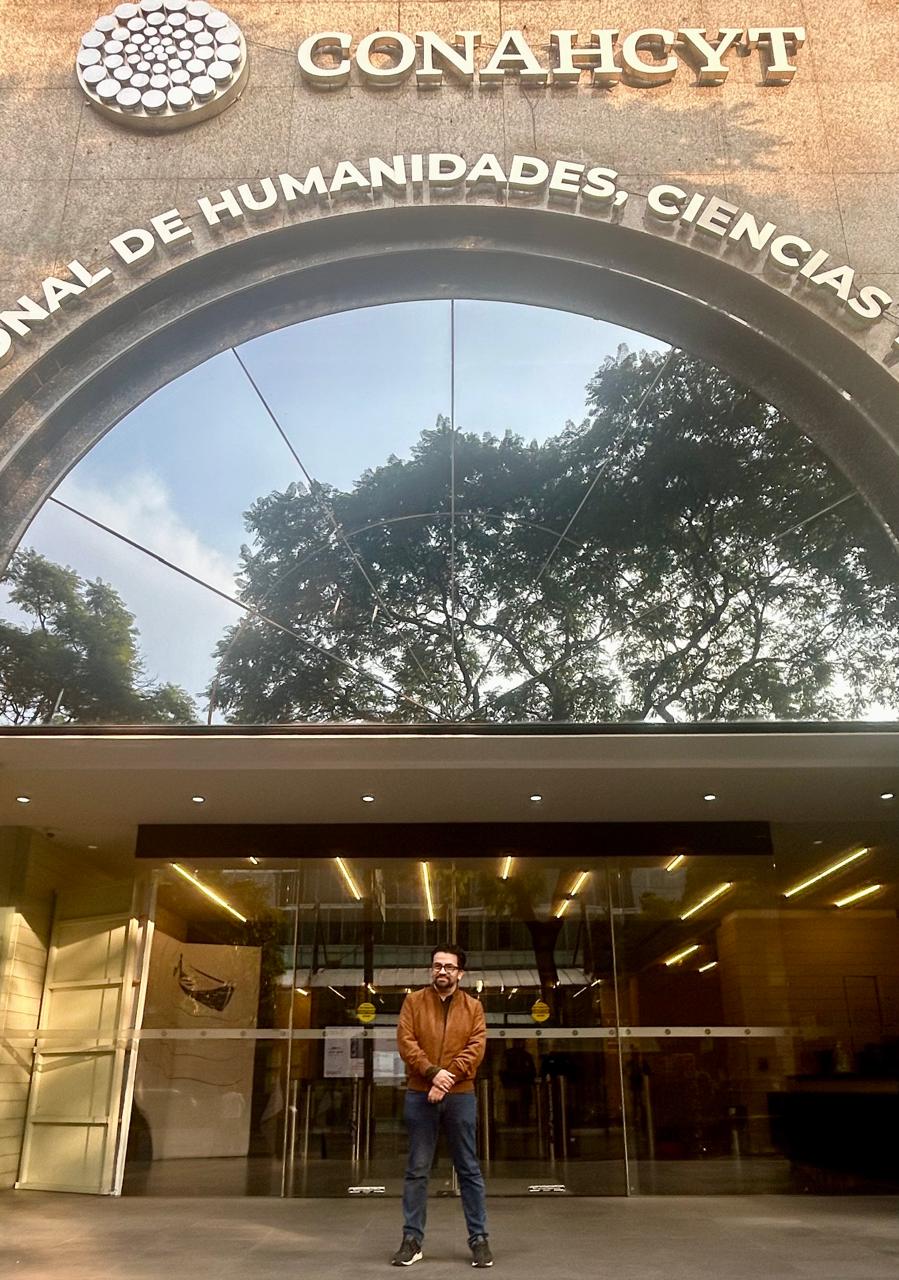‘One of My Goals Is to Encourage the Exchange between Russian and Mexican Philosophies’

Jorge Luis Méndez-Martínez, Research Fellow at the International Laboratory for Logic, Linguistics and Formal Philosophy, was named the winner of a competition of the National Council for Sciences, Technology and Humanities of Mexico. He was selected from hundreds of applicants for the position of Researcher for Mexico and will be working on a project on the philosophy of sound and auditory perception and the history of science in Mexico, Russia, and the Soviet Union. The HSE News Service talked to Mr Méndez-Martínez about the competition, his projects, and how playing the guitar helps him conduct research.
Jorge Luis Méndez-Martínez
— Congratulations on winning the competition! Tell us more about it.
— The National Council of Humanities, Sciences and Technologies is a federal government institution and it will soon become a ministry under the current administration. One of their main tasks is to promote highly qualified research in several fields. It is also the federal entity overseeing technological and scientific innovation. For instance, it developed the Mexican Covid-19 Vaccine ‘Patria’.
The ‘Researchers for Mexico’ programme (‘Investigadores por México’ in Spanish) started ten years ago (though by a different name). The purpose of the programme is to consolidate research institutions with highly qualified personnel and, on the other hand, to give highly qualified professionals (namely those holding a PhD diploma in sciences or humanities) the opportunity to continue their professional plans.
There is a call per year for the programme. As one of the council’s flagship programmes, ‘Researchers for Mexico’ received hundreds of applications this year. Only 25 applications were successful, thus yielding a very limited acceptance rate.
Accepted researchers are commissioned to develop a project within an institution for a 10-year period and are committed to making significant and relevant contributions to their field and, in most cases, to have a social perspective.

— You will be working on an ambitious project on the philosophy of sound and auditory perception and the history of science in Mexico, Russia and the Soviet Union. What are your ideas for the project?
My individual project is related to the research I have been doing for the last eight years at HSE, which pertains to sound and auditory perception
Likewise, a proposal for conducting research in the history of science that points to certain links between Mexico and Russia (and the Soviet Union) is in the works. I specifically would like to focus on certain key figures. Among them, I’d like to mention the Mexican philosopher Eli de Gortari, a logician, who published a work in the Soviet Union on dialectic logic (Введение в диалектическую логику). De Gortari was also the first—and to my knowledge the only—Mexican philosopher who published in the prestigious journal Voprosy Filosofii. Thus, one of my plans is to prepare a scientific paper in Russian about this author for that same journal and become the second Mexican philosopher to achieve this. One of my goals is to encourage the exchange between Russian and Mexican philosophies.
— You've previously worked with the logic of sound. Is it still an area of interest for you?
— Yes, it is still my area of expertise. I’ve still been publishing on this subject and some of my papers have even been cited in articles published in journals such as Inquiry.
Certainly, it is an area I am still cultivating and I am very grateful to HSE University for its support since I was doing my doctoral degree there and now as a research fellow. In particular, I would like to mention the support of Elena Dragalina-Chernaya, the head of my laboratory.
— You are a classical guitarist. How does it help you in your research?
—I am continuing with my career as a classical guitarist and am studying under the guidance of the prestigious Russian guitarist and composer Nadia Borislova, who is based here in Mexico. I won an international competition last year and gave a concert in January.
Interestingly, the project I was accepted for in the competition is partly related to music and encompasses certain activities with guitar at a pedagogical level
— Where are you based now and how is your work with the laboratory organised?
— As a research fellow with a distance contract, my duties have been purely focused on research and the publication of scientific papers. During 2024, two papers of mine were published, one in the prestigious Russian journal Horizon Studies in Phenomenology and in the Mexican journal Andamios, where I made a proposal on auditory cognition.
I am still taking part in the meetings of my laboratory. Our annual International Conference in Formal Philosophy will take place in a few weeks as well, and I am going to participate.
I am based in Mexico City. Hopefully next year I will visit Moscow with my three-year-old daughter Yekaterina, who is very keen on Russian culture (she loves to watch cartoons such as Cheburashka, Prostokvashino, and so forth) and likes to sign Oi To Nye Vecher and Goluboi Vagon.
I am looking forward to returning to Moscow very soon and to sharing the experience with my family
See also:
From Mexico to Buenos Aires: HSE University–St Petersburg Enhances Cooperation with Leading Universities in Latin America
New mobility programmes, academic exchanges, and unexpected collaborations—these are the results of the HSE University–St Petersburg delegation's mission to Latin America. Read on to find out about the key agreements made.
‘HSE University–St Petersburg Is Perfect for What I Was Seeking’
Every year, HSE University–St Petersburg welcomes international students from around the world not only for full-time programmes of all levels but also for academic mobility. This year, Michel Young Hernandez, a student from the Mexico Autonomous Institute of Technology, is among them. In this interview, Michel shares his experience of studying at HSE University–St Petersburg as an exchange student, why he decided to participate in the international mobility programme, and what his life in a new cultural landscape has been like.
‘Research Skills Helped Me a Lot in My Career’
Luis Santaella, from Mexico, graduated from the Bachelor’s programme ‘Political Science and World Politics’ in 2022. He participated in an international mobility programme in Rome during his studies and is currently working as a political consultant. In this interview, Luis shares his impressions of HSE University–St Petersburg and gives advice to future students from Latin America.
HSE University-St Petersburg Expands Cooperation with Universities in Mexico
In the framework of the academic mission to Latin America, the delegation from HSE University-St Petersburg headed by director Anna Tyshetskaya visited several universities in Mexico. During this trip, HSE signed cooperation agreements with two leading universities: Panamerican University and Universidad Popular Autónoma del Estado de Puebla (UPAEP).
‘We Cannot Understand the Modern Ideological Confrontation without the Accusations that Emerged during the Lausanne Process’
Rainer Matos Franco, from Mexico, defended his PhD thesis with honours at HSE University this June. In his dissertation, Rainer Matos Franco examines the history of anticommunism in Europe during the 1920s. The HSE News Service spoke with Rainer and his academic supervisor, Tatiana Borisova, about the significance of the Lausanne Process for the Cold War and contemporary history, the opportunities provided by HSE University for international PhD candidates, and the challenges of working with a vast database of historical sources.
‘My Prep Year Experience Has Been Phenomenal; I Would Repeat It All over Again if I Could’
The International Preparatory Year programme held its graduation ceremony in July. This academic year, 125 students from 50 countries were enrolled in the programme. They will continue their studies at Russian universities, most of them pursuing bachelor's and master's programmes at HSE University. The graduation was organised as a quest, where the students were able to demonstrate their achievements in learning the Russian language. Graduates from Ecuador, Syria, and Mexico shared their impressions with the HSE News Service, Deputy Director Polina Shanko talked about plans for the coming year, and mathematics teacher Vladimir Gordin gave his advice to future students.
‘The Graduation Ceremony Was the First Time We Saw Each Other’: 2023 MASNA Graduates Celebrate in Person
On July 3, the HSE University building on Pokrovka hosted the graduation ceremony of the Master’s in Applied Statistics with Network Analysis (MASNA). The programme, which trains students to use modern approaches in data and network analysis, is taught fully online in English. We spoke to Jiaxuan Wang, Sergio Camposortega, and Iris Cilenšek, three international students who came to Moscow for the graduation ceremony. The recent graduates shared their thoughts about the online format and finally meeting their classmates in person.
‘We Want to Make Sure that International Students Have Fulfilling Academic and Personal Lives’
The Council of the International Student Association (CISA) works to ensure that international students can live and study comfortably at HSE University and in Russia in general. At present, CISA consists of nine international students and its Chair. Its current activities include dealing with border closures, arranging vaccinations, and creating information channels for international students.
‘The City of Moscow Inspires Me with the Joy of Living’
The new academic year is gaining momentum at the HSE Preparatory Year, with students from over 40 countries currently enrolled. The HSE News Service talked to the new students about their first impressions and the challenges of studying at HSE University and living in Moscow, while teachers of the Prep Year extracurricular clubs shared their ideas and plans for future activities.


